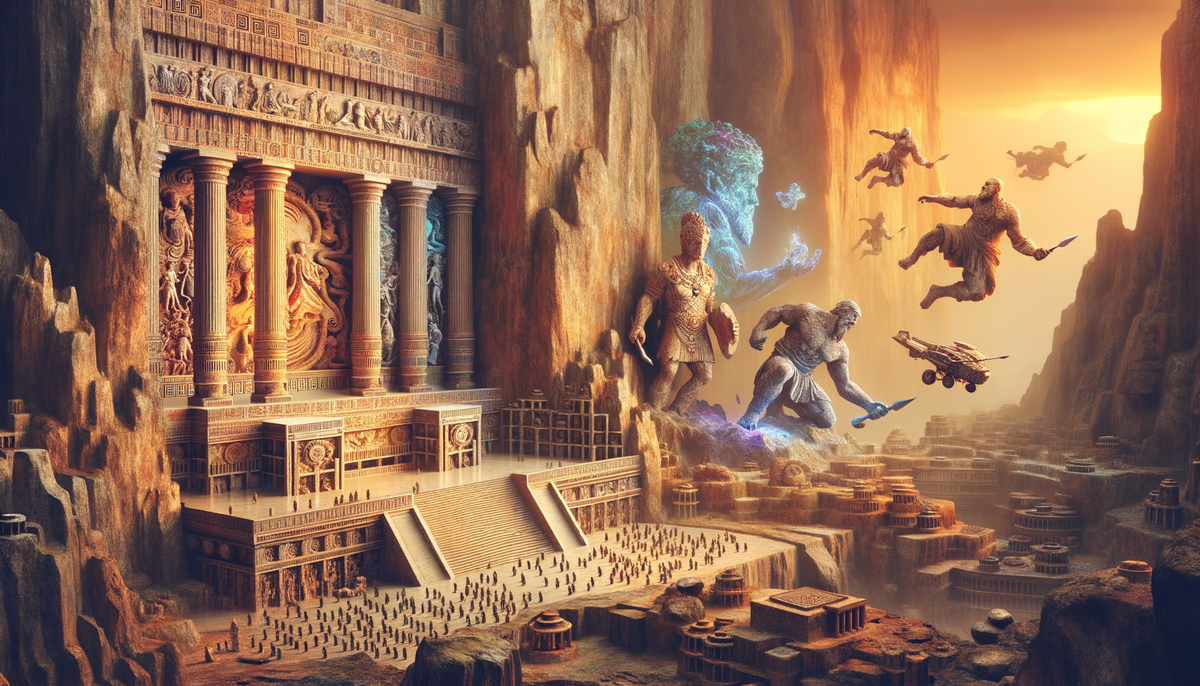Titans: The Forefathers of Greek Mythology and Their Lasting Impact
Explore the Titans of Greek mythology, their wars, and profound influence on cultural narratives.

Titans: The Forefathers of Greek Mythology and Their Lasting Impact
The term "Titans" conjures images of immense strength and formidable power, a legacy deeply rooted in Greek mythology. As the central figures in the mythological narratives preceding the reign of the Olympian gods, the Titans are not only fascinating as characters of ancient lore but also as symbols of cosmic forces and historical paradigms. In this extensive article, we explore who the Titans were, their role in myths, their cultural significance, and their impact on modern thought and popular culture.
Who Were the Titans?
The Titans were a powerful race of deities who preceded the Olympians, children of Uranus (Sky) and Gaia (Earth). According to Hesiod’s renowned work, Theogony, the primary Titans comprised twelve siblings: six brothers—Oceanus, Coeus, Crius, Hyperion, Iapetus, and Cronus—and six sisters—Theia, Rhea, Themis, Mnemosyne, Phoebe, and Tethys. This divine cohort of primordial beings laid the groundwork for the later Greek pantheon.
Role and Succession Myth
The Titans are central to the Greek succession myth, which epitomizes the tumultuous nature of cosmic inheritance and power struggle. When Uranus, fearing the potential overthrow by his progeny, imprisoned the Cyclopes and Hecatoncheires, his actions set off a chain reaction. Gaia, anguished by her children’s plight, instigated the Titans to overthrow Uranus. Led by Cronus, the Titans rose up and deposed their father, thus beginning Cronus’s tumultuous reign.
Cronus’s rule was equally fraught with fear of being toppled by his offspring, leading to the epic Titanomachy—a protracted conflict between the Titans and the Olympian gods, led by Zeus. This ten-year war culminated in the defeat of the Titans and their confinement to Tartarus, an infernal abyss beneath the earth.
The Titanomachy and Downfall
The Titanomachy stands as one of Greek mythology’s most pivotal narratives, detailing the overthrow of the old gods by the new order. This war allegorically represents the passage of time and changing of ages. Consequently, following their defeat, the Titans were imprisoned by Zeus who solidified his dominion over the cosmos. Some Titans, like Prometheus, known for their cunning and foresight, managed to maintain influence by taking sides with Zeus.
The enduring imagery of this celestial battle and its implications underscore a broader narrative found in mythologies worldwide—a narrative of succession, change, and eventual renewal.
Major Titans and Their Legacy
| Male Titans | Female Titans (Titanides) |
|---|---|
| Oceanus | Theia |
| Coeus | Rhea |
| Crius | Themis |
| Hyperion | Mnemosyne |
| Iapetus | Phoebe |
| Cronus | Tethys |
A deeper dive into some key figures reveals the robust mythology tied to each Titian. Cronus (or Kronos), the leader of the Titans, holds particular prominence. Often associated with time, his narrative intertwines with the imagery of the Roman Saturn. His dominion set the stage for the gods of Olympus who would follow. Oceanus, symbolic of the vast ocean encircling the world, and Iapetus, father to both Prometheus, the protector of mankind, and Atlas, the world-bearer, further underline the Titans' overarching influence.
Cultural Significance and Interpretations
Historically, the Titans have been revered as embodiments of a golden age—a divine epoch heralding peace and prosperity. Hesiod’s Works and Days extols their era as the height of virtue and bliss. Furthermore, Roman mythology adapted these tales, aligning Cronus with Saturn, marking an age of unprecedented order and abundance—an allegory for cultural and spiritual progression.
The legends surrounding the Titans continue to imbue our cultural consciousness, articulating themes of power, transition, and endurance. Their stories evolve in contemporary contexts, reflecting society’s appreciation for tales of grandeur and ethos of antiquity.
Influence and Modern Usage
In modern parlance, the term “titan” signifies anything of great strength or status, a linguistic nod to their mythological might. The Titans’ narrative underscores countless narratives in books and media, serving as archetypal references for novel plots and characters. This legacy highlights humanity's intrinsic connection to these ancient tales.
Summary
Throughout mythology, the Titans represent a monumental era of cosmic significance and mythic grandeur. From their eminent rise and reign to their ultimate downfall during the Titanomachy, these ancient beings have etched an indelible mark on the annals of world mythology and cultural ethos.
Practical Takeaway for Titans Professionals
For those engaged in fields requiring strategic foresight and strong foundations, the Titans offer a reservoir of allegorical wisdom. Recognizing the cyclical nature of authority and change as exemplified in their narratives can encourage resilience and adaptability in dynamic industries.
Relation to Our Services
At newsomix.com, we draw inspiration from the enduring legacy of the Titans to provide unparalleled insights and foresight into evolving market trends, helping businesses navigate through their own Titanomachies with confidence and expertise.
Explore the Titans
Discover more about the legendary Titans and their impact on our world. For deeper insights and detailed analyses, visit [newsomix.com](https://newsomix.com) to learn how these stories resonate in today’s context, guiding enterprises in their epic journeys to success.
For further details, consider exploring the documented accounts of the Greek Titans in various historical sources and discussions [here](https://www.espn.com/nfl/draft2025/story/_/id/44816178/2025-nfl-draft-live-updates-pros-cons-every-first-round-pick), [here](https://abcnews.go.com/GMA/Culture/video/qb-cam-ward-talks-1-pick-nfl-draft-121155443), and [here](https://www.nytimes.com/athletic/6301900/2025/04/24/nfl-draft-grades-2025-round-1-every-pick/).




